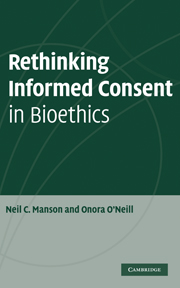Book contents
- Frontmatter
- Contents
- Preface
- Acknowledgements
- 1 Consent: Nuremberg, Helsinki and beyond
- 2 Information and communication: the drift from agency
- 3 Informing and communicating: back to agency
- 4 How to rethink informed consent
- 5 Informational privacy and data protection
- 6 Genetic information and genetic exceptionalism
- 7 Trust, accountability and transparency
- Some conclusions and proposals
- Bibliography
- Institutional sources and documents
- Index
6 - Genetic information and genetic exceptionalism
Published online by Cambridge University Press: 05 June 2012
- Frontmatter
- Contents
- Preface
- Acknowledgements
- 1 Consent: Nuremberg, Helsinki and beyond
- 2 Information and communication: the drift from agency
- 3 Informing and communicating: back to agency
- 4 How to rethink informed consent
- 5 Informational privacy and data protection
- 6 Genetic information and genetic exceptionalism
- 7 Trust, accountability and transparency
- Some conclusions and proposals
- Bibliography
- Institutional sources and documents
- Index
Summary
We have now set out our case for rethinking the role of informed consent in biomedical ethics. We have argued that informed consent is not simply a way of operationalising individual autonomy, and that its full importance can be seen only when it is integrated into a wider account of obligations (many of them with corresponding rights) that takes full account of the informational obligations that are particularly important in communicative transactions. Informed consent matters in biomedicine because patients and research subjects can use it to waive others' obligations (and their own rights), if and when they have reason to do so. In particular, they can use informed consent to waive others' obligations not to violate their bodily integrity, not to infringe other liberty rights, and not to intrude into private affairs.
We have argued that the point and purpose of informed consent is obscured unless it is set in the context of an agency-based model of informing and communicating. This model supports a steady focus on a wide range of obligations, including, in particular, the everyday informational obligations that bear on epistemic and communicative action and transactions. By considering a wide range of the informational obligations that are generally important in biomedical practice, we can gain a better and more focused understanding of the importance of informed consent, and so of the standards that it must meet.
A focus on informational obligations is particularly important where biomedical practice deals with apparently distinctive types of information.
- Type
- Chapter
- Information
- Rethinking Informed Consent in Bioethics , pp. 130 - 153Publisher: Cambridge University PressPrint publication year: 2007

